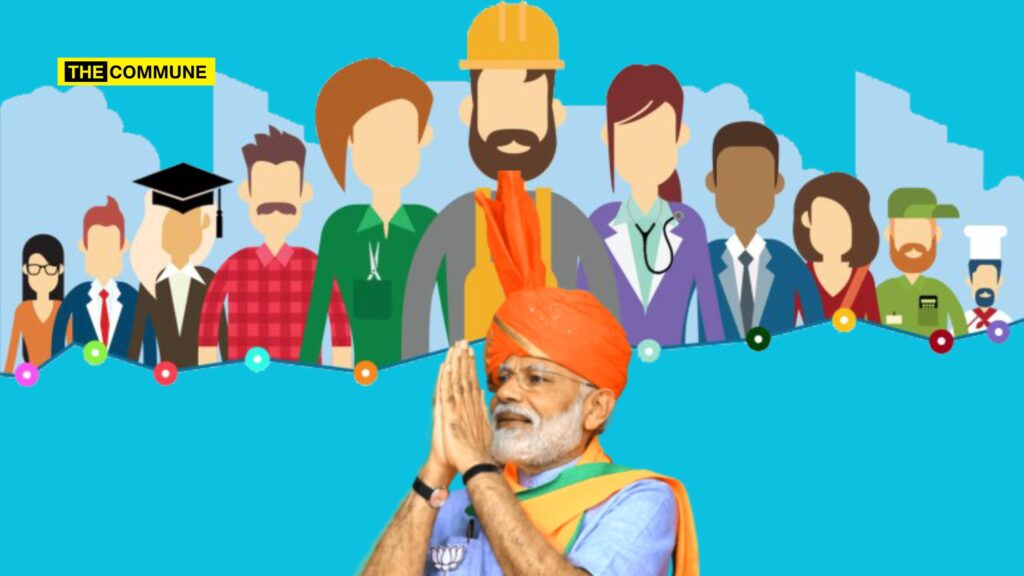India’s economic trajectory in recent years has been impressive, defying global headwinds. However, a critical disconnect remains – this growth hasn’t translated into sufficient job creation. During the recent elections, unemployment was a vital issue, highlighting its far-reaching implications for India’s development.
The Numbers Don’t Lie: A Slow Decline with Urgent Concerns
While unemployment rates have marginally decreased since 2004, the pace has been excruciatingly slow, particularly post-2014, with a brief exception in 2019. The COVID-19 pandemic caused a temporary spike, but the rate hasn’t surpassed pre-pandemic levels, even with subsequent recovery.
However, the situation for youth (15-24 years) is alarming. Their unemployment rate has more than doubled since 2012, though it has gradually decreased in recent years, remaining stubbornly high at almost 15.47% in 2023.
The Disparity Between Growth and Employment
A report by the International Labour Organization (ILO) and the Institute for Human Development (IHD) revealed a worrying trend. Despite strong economic growth (GVA) between 2012 and 2019, job creation lagged significantly. This suggests a mismatch between skillsets and job demands. This, coupled with issues like discrimination against migrant workers and outdated curriculums, has hindered India’s ability to capitalise on its young demographic.
Government Initiatives: Steps Taken, But More Needed
The government has also implemented various initiatives to address unemployment, including:
- Aatmanirbhar Bharat Rojgar Yojana (ABRY): Incentivizes companies to create new jobs and restore those lost during the pandemic.
- Garib Kalyan Rojgar Abhiyaan (GKRA): Provided temporary employment for migrant workers and others impacted by the pandemic.
- Prime Minister Street Vendor’s AtmaNirbharNidhi (PM SVANidhi Scheme): Offers collateral-free loans to street vendors to restart businesses.
- Pradhan Mantri Mudra Yojana (PMMY): Provides micro, small, and medium enterprises (MSMEs) with access to collateral-free loans.
- Skill development and training programs: Equip young people with relevant skills to enhance their employability.
Union Budget 2024
In 2024, the Union Budget allocated ₹10,000 crore for a New Employment Generation Scheme, which includes a paid internship program to provide one crore youth an opportunity to work at 500 top companies over the next five years.
The government has unveiled comprehensive measures to address unemployment, focusing on empowering India’s youth. Scheme A, designed for first-time employees registered with the EPFO, provides direct benefit transfers equivalent to one month’s salary, capped at Rs 15,000, distributed in three instalments. This initiative aims to significantly boost young professionals starting their careers, as it offers a much-needed financial safety net.
Scheme B focuses on the manufacturing sector, incentivizing employees and employers regarding their EPFO contributions in the first four years of employment. By reducing the financial burden on both parties, the scheme encourages job creation and sustains employment in this vital sector, contributing to overall economic development.
Scheme C focuses on supporting employers not covered by other schemes, emphasizing centre-state collaboration to skill 2 million youth over five years and upgrade 1,000 Industrial Training Institutes to a hub-and-spoke model with an outcome orientation. This approach ensures that a broader range of employers can benefit from government support, fostering a more inclusive and equitable economic environment.
Other Government Schemes
In addition to these targeted schemes, the government has revised the Model Skill Loan Scheme to provide loans of up to Rs 7.5 lakh, guaranteed by a government-promoted fund, benefiting 25,000 students annually. Furthermore, financial support for loans up to Rs 10 lakh for higher education at domestic institutions will be provided to youth not qualifying for other schemes, with e-vouchers offering an annual interest subvention of 3% on the loan amount.
Experts argue they fall short of meeting the growing job demand despite these efforts.
The Way Forward: A Multi-Pronged Approach
To create a sustainable and inclusive job market, India needs to focus on several key areas:
- Improving Data Collection and Analysis: Inconsistent methodologies by different agencies make it difficult to assess the unemployment situation accurately.
- Shifting Focus from Services to Manufacturing: While the services sector employs skilled workers, India needs to create more jobs in manufacturing to absorb its large unskilled and semi-skilled workforce.
- Encouraging Entrepreneurship and Self-Employment: Promoting this can create new jobs and opportunities for individuals to start their businesses.
- Reforming Education and Training: Educational institutions must align their curriculums with the job market demands and equip students with the skills needed to succeed in the modern economy.
- Addressing Social and Cultural Barriers: Discrimination against migrant workers and outdated societal perceptions about specific types of jobs can hinder employment opportunities.
Experts’ Recommendations and Ongoing Discussions
A recent webinar by the Policy Consensus Centre, “Unlocking Potential, Unleashing Opportunities: A Policy Dialogue on Employment in India,” brought together various experts to discuss solutions. Key recommendations include:
- Standardized data collection and analysis for better policymaking.
- Leveraging technology for efficient government job vacancy announcements.
- A shift in societal mindset towards MSMEs and self-employment.
- Revamping the Make in India initiative to create more assembly line jobs in MSMEs.
- Credit schemes, streamlined regulations, and tax policies for start-up MSMEs to foster entrepreneurship.
- Eradicating discrimination against migrant workers.
- Developing practical, technology-focused curriculums in educational institutions.
- Exploring new service sectors like animation and gaming to create job opportunities.
- Ensuring women’s safety at workplaces and providing supportive infrastructure.
Conclusion
While India’s economic growth is commendable, addressing unemployment remains a critical challenge. By implementing policies on skill development, sectoral diversification, and entrepreneurship, India can create a more sustainable and inclusive job market for its growing workforce. Bridging the gap between growth and job creation is vital for India’s long-term social and economic prosperity.
Arindam Goswami and Nirupama Soundararajan, co-founders and partners at Policy Consensus Centre, New Delhi wrote this article.
(Subscribe to our Telegram, WhatsApp, and Instagram channels and get the best stories of the day delivered to you personally.)

